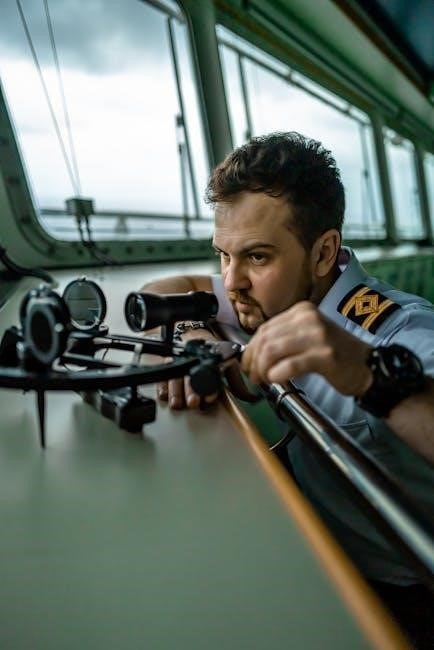Maritime English serves as the lingua franca for foreign officers‚ ensuring safety and efficiency in global maritime operations. It is essential for clear communication‚ task execution‚ and compliance with international standards.
1.1 Definition and Importance
Maritime English is a specialized form of English tailored for the maritime industry‚ enabling clear communication among seafarers and compliance with international standards. It is essential for ensuring safety‚ preventing accidents‚ and facilitating efficient ship operations. Proficiency in Maritime English is a mandatory requirement for foreign officers under the STCW Convention‚ as it promotes effective communication in emergencies and routine tasks‚ thereby safeguarding crew‚ passengers‚ and cargo. Its importance lies in its role as a global lingua franca for the maritime sector.
1.2 Role in the Maritime Industry
Maritime English plays a pivotal role in facilitating standard communication among diverse crew members‚ ensuring clarity in ship operations. It reduces errors in navigation‚ cargo handling‚ and emergency responses‚ fostering global maritime operations. By enabling effective interaction‚ it ensures compliance with safety protocols and international regulations‚ such as the STCW Convention. Proficiency in Maritime English is vital for foreign officers to perform their duties efficiently‚ contributing to the overall safety and success of maritime activities worldwide.

International Standards for Maritime English
International standards‚ such as the IMO Model Course 3.17 and the STCW Convention‚ establish guidelines for Maritime English proficiency‚ ensuring uniform communication and safety globally.
2.1 IMO Model Course 3.17
The IMO Model Course 3.17 provides a structured curriculum for Maritime English training‚ focusing on specialized vocabulary‚ grammar‚ and standard marine communication phrases. It ensures that foreign officers meet international standards for effective communication at sea. The course covers practical tasks‚ such as navigating‚ cargo operations‚ and emergency responses‚ to enhance safety and efficiency. Compliance with this course is essential for officers to demonstrate proficiency in Maritime English and operate confidently in global maritime environments.
2.2 STCW Convention Requirements
The STCW Convention mandates that foreign officers demonstrate adequate English proficiency to perform duties safely and efficiently. This includes reading‚ writing‚ and communication skills‚ as well as understanding safety procedures. Compliance with these requirements ensures effective communication‚ preventing accidents and promoting safe navigation. Proficiency in Maritime English is a critical component of STCW certification‚ enabling officers to meet global maritime standards and operate confidently in international waters.
2.3 The MarTEL Project
The MarTEL Project aims to establish standardized Maritime English guidelines worldwide‚ ensuring consistent language training and assessment. It provides comprehensive resources‚ including teaching materials and frameworks‚ to support foreign officers in meeting industry standards. MarTEL aligns with international conventions‚ focusing on practical communication skills and safety-critical scenarios. By harmonizing Maritime English training‚ the project enhances global maritime safety and efficiency‚ benefiting both officers and organizations across the industry.
English Language Requirements for Foreign Officers
Foreign officers must meet mandatory proficiency levels in English‚ ensuring effective reading‚ writing‚ and communication skills to perform duties safely and efficiently‚ as outlined in the STCW Code.
3.1 Mandatory Proficiency Levels
Foreign officers must meet specific English proficiency levels to ensure safe and efficient maritime operations. These levels are mandated by international conventions like the STCW Code‚ requiring officers to demonstrate competence in reading‚ writing‚ speaking‚ and listening. Proficiency assessments are conducted to verify their ability to understand and execute safety procedures‚ communicate effectively‚ and handle emergency situations. Compliance with these standards is critical for certification and operational safety in the maritime industry.
3.2 Key Skills: Reading‚ Writing‚ and Communication
Proficiency in reading‚ writing‚ and communication is essential for foreign officers to perform their duties effectively. Officers must read and understand technical documents‚ safety manuals‚ and operational instructions. Clear and accurate writing skills are necessary for reporting incidents and maintaining records. Effective communication ensures seamless interaction with crew members‚ shore-based personnel‚ and other vessels‚ critical for preventing accidents and ensuring efficient ship operations. These skills are reinforced through structured training and practical exercises.
3.4 Assessment and Certification
Assessment and certification in Maritime English ensure that foreign officers meet international standards. Evaluations include reading‚ writing‚ and communication tests aligned with the STCW Convention and IMO Model Course 3.17. Certificates are issued upon successful completion‚ confirming proficiency. These assessments are critical for ensuring compliance with global maritime regulations and for officers to work effectively in international crews. Regular updates to certification processes reflect industry changes‚ maintaining relevance and safety standards.

Maritime English Courses and Curricula
Maritime English courses are designed for foreign officers to meet international standards. They include structured curricula covering specialized vocabulary‚ communication skills‚ and industry-specific terminology‚ ensuring officers can perform duties safely and effectively.
4.1 Structured Curriculum Overview
A structured maritime English curriculum ensures foreign officers achieve proficiency in specialized vocabulary‚ grammar‚ and standard marine communication phrases. It aligns with IMO standards‚ focusing on practical skills for deck and engineering roles. The curriculum includes units on ship operations‚ safety procedures‚ and professional communication‚ ensuring officers can perform duties effectively. Resources like PDF handbooks and workbooks are integrated to enhance learning‚ with regular updates reflecting industry changes and compliance with international maritime standards.
4.2 Key Topics Covered
Maritime English courses cover essential topics such as introducing oneself‚ describing duties‚ and giving orders. They focus on specialized vocabulary‚ technical terms‚ and standard communication phrases. Safety procedures‚ emergency response‚ and navigation terminology are emphasized. Practical skills like reporting incidents and understanding ship operations are also included. These topics ensure foreign officers can communicate effectively‚ perform tasks safely‚ and comply with industry standards‚ making them indispensable for professional competence in the maritime industry.
4.3 Role of PDF Resources
PDF resources play a vital role in maritime English training by providing comprehensive‚ accessible materials. They cover essential topics like ship operations and safety procedures‚ offering practical exercises and real-life examples. These resources are regularly updated to reflect industry changes‚ ensuring relevance. Officers can download them easily‚ making self-study convenient. PDFs are invaluable for improving language skills‚ enhancing professional competence‚ and ensuring compliance with international maritime standards‚ thus supporting effective communication at sea.

Teaching Methods and Approaches
Methods include task-based learning‚ role-plays‚ and simulations‚ focusing on practical communication skills for real-life maritime scenarios‚ ensuring officers can apply language effectively in professional contexts.
5.1 Task-Based Learning
Task-based learning focuses on real-life maritime scenarios‚ enabling foreign officers to practice practical communication. Activities include giving orders‚ describing duties‚ and solving problems. This approach enhances language skills through authentic contexts‚ ensuring officers can apply English effectively in professional situations. It emphasizes hands-on experience‚ fostering confidence and competence in navigating maritime operations‚ cargo handling‚ and emergency responses. By simulating real tasks‚ officers develop the ability to communicate clearly and efficiently‚ aligning with industry requirements and safety standards.
5.2 Role-Plays and Simulations
Role-plays and simulations are effective methods for teaching maritime English‚ allowing foreign officers to practice real-life scenarios. These activities simulate shipboard interactions‚ emergencies‚ and navigation tasks‚ enhancing practical communication skills. Officers engage in exercises like coordinating cargo operations or responding to distress calls‚ improving their ability to use standard phraseology and understand complex situations. By replicating authentic maritime environments‚ these tools build confidence and ensure officers can apply their language skills effectively in critical situations.
5.3 Use of Authentic Materials
Authentic materials‚ such as ship manuals‚ safety protocols‚ and real-life scenarios‚ are vital for teaching maritime English. These resources bridge the gap between theory and practice‚ enabling foreign officers to engage with genuine maritime contexts. By using actual documents and industry-specific texts‚ instructors provide practical exposure to terminology‚ procedures‚ and communication styles. This approach enhances learners’ ability to apply language skills effectively in real-world situations‚ ensuring they can navigate‚ communicate‚ and respond to emergencies with confidence and accuracy.
Maritime English Textbooks and Supplementary Materials
Maritime English textbooks and supplementary resources‚ such as workbooks and audio recordings‚ provide comprehensive learning tools for foreign officers. These materials cover industry-specific vocabulary‚ safety procedures‚ and communication skills‚ ensuring officers can perform their duties effectively. Regular updates keep the content relevant and aligned with industry standards‚ making them indispensable for professional development and compliance with international maritime requirements.
6.1 Overview of Key Textbooks
Key textbooks like the Maritime English Handbook by Pietro del Rosso and Maritime English by Dina El-Dakhs provide essential language skills and industry-specific knowledge. These resources cover vessel operations‚ safety protocols‚ and standardized communication‚ aligning with international standards like the STCW Convention. They are designed to meet the needs of foreign officers‚ offering practical exercises and real-life scenarios. Supplementary materials‚ such as workbooks and audio recordings‚ enhance learning‚ ensuring officers can communicate effectively in English for safe and efficient maritime operations.
6.2 Workbooks and Audio Recordings
Workbooks and audio recordings complement maritime English textbooks‚ offering practical exercises to enhance vocabulary‚ grammar‚ and communication skills. These resources focus on industry-specific terminology and scenarios‚ such as safety drills and navigation commands. Audio recordings provide authentic listening practice‚ helping officers understand accents and standard maritime phraseology. Together‚ these materials ensure comprehensive learning‚ aiding foreign officers in mastering the language skills necessary for professional duties and compliance with international maritime standards.
6.3 Regular Updates and Relevance
Maritime English materials are regularly updated to reflect industry changes‚ ensuring relevance and compliance with the latest international standards. These updates incorporate new regulations‚ technological advancements‚ and evolving communication practices. Collaborations between maritime institutions and language experts guarantee that resources remain aligned with real-world demands. Regular revisions ensure that foreign officers receive accurate and up-to-date information‚ enhancing their ability to communicate effectively and safely in a dynamic maritime environment.

The Role of Safety in Maritime English
Clear communication in Maritime English is critical for preventing accidents and ensuring crew safety. It enables precise understanding of safety procedures and emergency responses‚ safeguarding lives and operations at sea.
7.1 Preventing Accidents Through Clear Communication
Clear communication in Maritime English is essential for preventing accidents at sea. Misunderstandings due to language barriers can lead to critical errors‚ risking lives and operations. Standardized phraseology ensures precise understanding of commands and safety procedures. Effective communication reduces the likelihood of misinterpretations‚ enabling crew members to respond promptly and correctly in emergency situations. This clarity is vital for navigation‚ cargo handling‚ and emergency response‚ ultimately safeguarding lives and ensuring operational safety.
7.2 Understanding Safety Procedures
Understanding safety procedures is a cornerstone of Maritime English training for foreign officers. Clear comprehension of standardized protocols‚ emergency drills‚ and operational guidelines is essential for preventing accidents. Miscommunication can lead to critical errors‚ risking lives and vessel safety. Proficiency in Maritime English ensures officers can interpret and execute safety instructions accurately‚ adhere to international regulations‚ and respond effectively in high-stress situations. This understanding is vital for maintaining safety standards and operational efficiency at sea.
7.3 Emergency Response Communication
Effective emergency response communication is critical in maritime operations. Clear and precise language ensures swift actions‚ preventing misunderstandings during crises like fires‚ system failures‚ or medical emergencies. Proficiency in Maritime English enables officers to convey urgent information accurately‚ facilitating coordinated responses. Resources like the English-for-Maritime PDF provide practical exercises and real-life scenarios to enhance emergency communication skills. This training builds confidence and readiness‚ ensuring officers can handle high-pressure situations effectively‚ safeguarding lives and vessel safety.

Maritime English for Deck and Engineering Officers
Deck and engineering officers require specialized vocabulary and terminology for tasks like navigation‚ machinery operations‚ and safety protocols. This ensures clear communication and effective task execution at sea.
8.1 Specialized Vocabulary
Deck and engineering officers must master specialized vocabulary related to their roles. Deck officers focus on terms like bow‚ stern‚ port‚ starboard‚ keel‚ decks‚ bridge‚ while engineering officers use terms like engine room‚ propeller‚ cargo holds. This terminology is vital for clear communication and effective task execution‚ ensuring safety and efficiency in maritime operations. Standardized language helps prevent errors and promotes professionalism.
8.2 Position-Specific Terminology
Foreign officers require position-specific terminology to communicate effectively in their roles. For example‚ Masters and senior officers use terms like bridge‚ charts‚ navigation systems‚ while chief engineers focus on engine room‚ machinery‚ propeller‚ fuel systems. Other officers learn terms like deck operations‚ cargo handling‚ safety equipment. This specialized language ensures clear communication‚ safety‚ and operational efficiency‚ enabling officers to fulfill their roles effectively in the maritime industry.
8.3 Practical Applications
Foreign officers apply Maritime English in real-life scenarios‚ such as emergency response communication‚ navigational instructions‚ and crew coordination. Practical applications include using standard phrases during ship-to-shore or ship-to-ship communications and understanding safety procedures. Clear communication ensures accident prevention and efficient task execution‚ making it vital for deck and engineering officers to handle daily operations and critical situations effectively‚ ensuring safety and operational success in the maritime industry.
Online Resources and PDF Downloads
English-for-Maritime PDFs provide comprehensive resources for foreign officers‚ covering ship operations‚ safety procedures‚ and communication skills. These downloadable materials are accessible in multiple formats‚ ensuring easy access and practical learning.
9.1 English-for-Maritime PDF Overview
The English-for-Maritime PDF is a comprehensive resource designed for foreign officers‚ offering detailed insights into maritime communication‚ safety procedures‚ and operational terminology. It covers essential topics such as ship operations‚ emergency response‚ and professional duties‚ ensuring officers can communicate effectively. The PDF is structured into 10 units‚ each focusing on specific aspects of maritime English‚ from introductions to complex operational commands; Regular updates ensure the content remains relevant and aligned with industry standards‚ making it an invaluable tool for maritime professionals worldwide.
9.2 Units and Topics Covered
The English-for-Maritime PDF is divided into 10 units‚ each addressing specific aspects of maritime communication. Topics include introducing oneself as a seafarer‚ describing daily duties‚ giving orders‚ and understanding safety procedures. The curriculum also covers emergency response communication‚ navigation terms‚ and operational commands. Practical scenarios and industry-specific terminology are emphasized to prepare foreign officers for real-world challenges. The structured approach ensures comprehensive coverage of essential maritime English skills‚ tailored to professional requirements.
9.3 Accessibility and Formats
The English-for-Maritime PDF is available in multiple formats‚ including PDF and text files‚ ensuring accessibility across various devices. It is freely downloadable‚ making it widely accessible for foreign officers worldwide. The resource is compatible with smartphones‚ tablets‚ and computers‚ allowing officers to study conveniently. Regular updates ensure the content remains relevant and aligned with industry changes. This accessibility promotes continuous learning and skill improvement for maritime professionals. Formats cater to diverse learning needs‚ enhancing overall usability.

Future Directions in Maritime English Training
Future directions include integrating AI and VR for immersive learning‚ updating courses to reflect industry changes‚ and expanding online accessibility to enhance global maritime communication and safety standards.
10.1 Proposals for Course Improvement
Proposals for improving maritime English courses include integrating AI-driven language tools and virtual reality simulations to enhance interactive learning. Updated curricula should reflect current industry challenges and technological advancements. Incorporating real-time feedback systems and peer-to-peer learning platforms can foster engagement and proficiency. Additionally‚ expanding access to online resources and PDF materials ensures flexibility for foreign officers to study at their own pace‚ improving overall language competency and practical application.
10.2 Research Topics for Enhanced Learning
Research topics for enhancing maritime English learning include investigating the impact of cognitive load on language acquisition‚ developing personalized learning strategies‚ and exploring the role of cultural factors in communication. Additionally‚ studies on integrating virtual reality for immersive training and assessing the effectiveness of AI-based feedback systems could significantly improve learning outcomes. These areas aim to address gaps in current methodologies and adapt to the evolving needs of foreign officers in the maritime industry.
10.3 Industry Updates and Adaptations
The maritime industry continuously adapts to evolving requirements‚ with updates focusing on standardized English language testing and curriculum revisions. The MarTEL project highlights the need for global English language standards‚ ensuring consistency across regions. Additionally‚ advancements in digital learning tools and AI-driven assessments are transforming maritime English training. These updates reflect the industry’s commitment to improving communication‚ safety‚ and operational efficiency‚ ensuring foreign officers meet current and future demands effectively.

